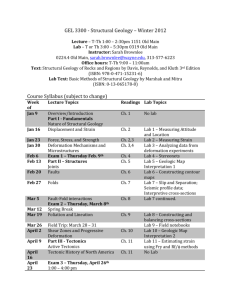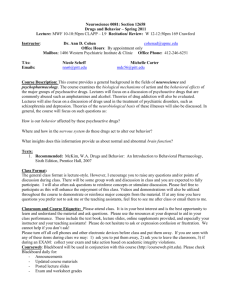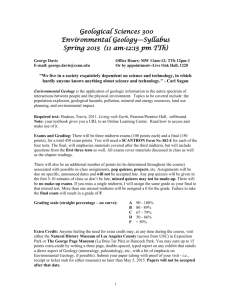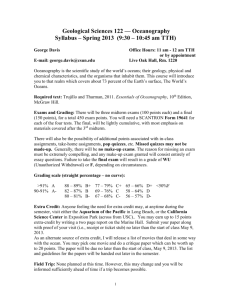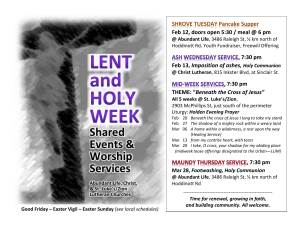Section 010 – David Wrobel
advertisement
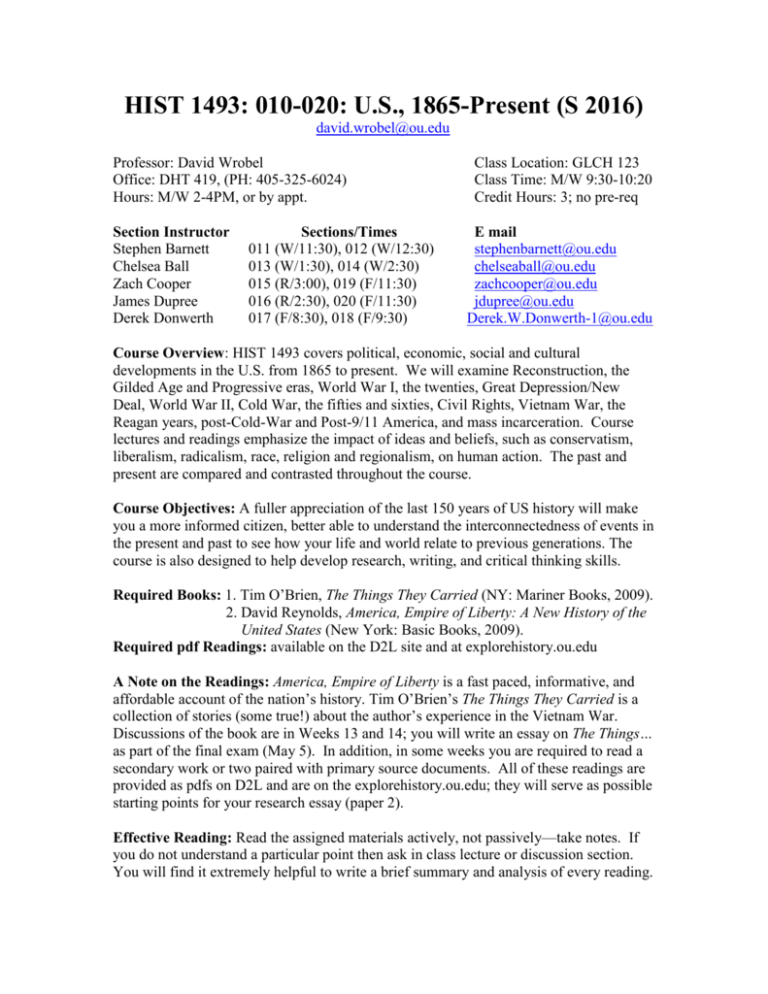
HIST 1493: 010-020: U.S., 1865-Present (S 2016) david.wrobel@ou.edu Professor: David Wrobel Office: DHT 419, (PH: 405-325-6024) Hours: M/W 2-4PM, or by appt. Section Instructor Stephen Barnett Chelsea Ball Zach Cooper James Dupree Derek Donwerth Sections/Times 011 (W/11:30), 012 (W/12:30) 013 (W/1:30), 014 (W/2:30) 015 (R/3:00), 019 (F/11:30) 016 (R/2:30), 020 (F/11:30) 017 (F/8:30), 018 (F/9:30) Class Location: GLCH 123 Class Time: M/W 9:30-10:20 Credit Hours: 3; no pre-req E mail stephenbarnett@ou.edu chelseaball@ou.edu zachcooper@ou.edu jdupree@ou.edu Derek.W.Donwerth-1@ou.edu Course Overview: HIST 1493 covers political, economic, social and cultural developments in the U.S. from 1865 to present. We will examine Reconstruction, the Gilded Age and Progressive eras, World War I, the twenties, Great Depression/New Deal, World War II, Cold War, the fifties and sixties, Civil Rights, Vietnam War, the Reagan years, post-Cold-War and Post-9/11 America, and mass incarceration. Course lectures and readings emphasize the impact of ideas and beliefs, such as conservatism, liberalism, radicalism, race, religion and regionalism, on human action. The past and present are compared and contrasted throughout the course. Course Objectives: A fuller appreciation of the last 150 years of US history will make you a more informed citizen, better able to understand the interconnectedness of events in the present and past to see how your life and world relate to previous generations. The course is also designed to help develop research, writing, and critical thinking skills. Required Books: 1. Tim O’Brien, The Things They Carried (NY: Mariner Books, 2009). 2. David Reynolds, America, Empire of Liberty: A New History of the United States (New York: Basic Books, 2009). Required pdf Readings: available on the D2L site and at explorehistory.ou.edu A Note on the Readings: America, Empire of Liberty is a fast paced, informative, and affordable account of the nation’s history. Tim O’Brien’s The Things They Carried is a collection of stories (some true!) about the author’s experience in the Vietnam War. Discussions of the book are in Weeks 13 and 14; you will write an essay on The Things… as part of the final exam (May 5). In addition, in some weeks you are required to read a secondary work or two paired with primary source documents. All of these readings are provided as pdfs on D2L and are on the explorehistory.ou.edu; they will serve as possible starting points for your research essay (paper 2). Effective Reading: Read the assigned materials actively, not passively—take notes. If you do not understand a particular point then ask in class lecture or discussion section. You will find it extremely helpful to write a brief summary and analysis of every reading. 2 Requirements & Grading: 1st midterm, in-class (50 minutes): 2nd midterm, in-class (50 minutes): Final exam: in-class (two hours): Paper 1: Primary Sources (1,000 words) Paper 2: Research Essay (2,000 words): Attendance/Discussion: 1000 Points Total 15% (150 points) 15% (150 points) 20% (200 points) 10% (100 points) 25% (250 points) 15% (150 points) The +/- grading system will be used for all assignments (not for final grades); the scale is: A 93-100 B+ 87-89 C+ 77-79 D+ 67-69 A90-92 B 83-86 C 73-76 D 60-66 B80-82 C70-72 F 0-59 Exams: Each exam covers a third of the course content. The exams are not intended primarily as tests of your memorization skills, but as measures of your understanding of and engagement with the material. The exams are tied closely to readings, lectures, and discussions. It is essential that you attend class, take good notes and regularly review and rewrite them, read the assigned materials carefully, and participate in discussions. These steps will help prepare you for exams. Make-up exams will be given only in rare circumstances and only if you have a genuine, verifiable, and important excuse. The 1st and 2nd midterms: 50-minute in-class exams, 150 points: two parts: A) 2 Triads: 50 points each (100 total). B) 25 multiple-choice questions: 2 points each (50 total). The 2-hour non-comprehensive final, 200 points: three parts: A) 2 Triads: 50 points each (100 total). B) 25 multiple choice: 2 points each (50 total). C) 1 Essay (50 points). Study guides for each exam will be available on D2L a full two weeks prior to the date. Extra Credit: A range of extra credit opportunities will be offered this semester. You may complete up to five assignments, each worth up to 10 points (a total of 50 points). Attendance: is required. Absences will lower your grade because: 1. the three in-class exams (50% of your grade) draw on course lectures and readings; 2. discussion and attendance counts for 15% of your grade; 3. we will discuss the course papers (35% of your grade) in lectures and discussion; 4. You may miss a total of three classes (2 lectures and 1 discussion) without penalty or explanation; thereafter ten points are deducted for each unexcused absence. In addition, you may be administratively dropped from the course if you have more than six unexcused absences from class. Schedule & Assistance: M and W 9:30-10:20 class sessions are lectures; discussion sections are on W, R, or F. Please complete all reading assignments before your discussion section. I encourage you to come to my office hours to introduce yourself and discuss matters relating to the course. You can also contact me via phone, E-mail, or the D2L site. Please also draw on the expertise of the course TA’s. 3 D2L: Course materials including the syllabus, course calendar, Powerpoint lectures, exam study guides, readings, film clips and other visual materials (e.g. maps, charts, and photographs), and links to useful websites are available on the course D2L site. The site is easily accessible and navigable. Everyone must visit the D2L during week one and should check it regularly. The site is designed to augment attendance in the class; it is not a virtual experience that can substitute for the classroom experience. Academic Integrity: http://integrity.ou.edu Webster's New World Dictionary of the American Language (Cleveland, 1964) states that plagiarism is “to take and pass off as one's own the ideas, writings, etc. of another.” Plagiarism is easy to spot; more importantly, it is ethically unsound. Plagiarism on the research paper (this includes purchasing a paper), turning in work that has been previously submitted for another class, or cheating on exams will result in an “F” for the assignment, notification of the Student Conduct Office and possibly an “F” for the class and further disciplinary action. All exams are closed book. Sign the integrity pledge for the essays (website address above). Disabilities: Any student in this course who has a disability that may prevent him or her from fully demonstrating his or her abilities should contact me personally as soon as possible so we can discuss accommodations necessary to ensure full participation and facilitate your educational opportunities. The Disability Resource Center provides support services to students with disabilities: see www.ou.edu/drc, or please contact Director Chelle’ Guttery at drc@ou.edu, 325-3852 voice, or 325-4173 TDD. Religious Accommodations: It is the policy of the University to excuse absences of students that result from religious observances and to provide without penalty for the rescheduling of examinations and additional required class work that may fall on religious holidays. Extra-Curricular Activities: Students involved in OU official extra-curricular activities should inform me at the beginning of the semester of any known scheduling conflicts. Classroom Etiquette: Please, during class time, do not text, take phone calls, or use laptops, I-pads, tablets, or other electronic devices for anything other than class related purposes. Laptops, etc., may be used for note taking. Please do not arrive late for class, and do not leave class early without informing your TA or me of a special circumstance. PART ONE: 1865-1914 Wk 1: W, Jan 20: Lecture 1: Course Intro/Civil War & Reconstruction: Overview W/R/F, Jan 20-22: Discussion 1: Reconstruction + (W) Primary Source Analysis Required Reading: Reynolds, America, Ch.8; Reconstruction primary source documents Wk 2: M, Jan 25: Lecture 2: Legacies & Changing Views of Reconstruction W, Jan 27: Lecture 3: National Growth: Urban, Industrial, Demographic W/R/F, Jan 27-29: Discussion 2: Remembering Reconstruction & the Gilded Age Required Reading: Reynolds, America, Ch.9; & Reconstruction documents review 4 Wk 3: M, Feb 1: Lecture 4: World of Clashing Darwinisms/Conservatism & Liberalism W, Feb 3: Lecture 5: Geographic Expansion & Agrarian Revolt W/R/F, Feb 3-5: Discussion 3: Late 19th-Century Ideas + (W) Thesis & Evidence Required Reading: Witt, “Crippled Workmen, Destitute Widows…” (2006); Sumner, “What the Social Classes Owe to Each Other” (1883); Ward, “Mind as a Social Factor” (1884); and “The Omaha Platform” (1892) Wk 4: M, Feb 8: Lecture 6: War and Empire W, Feb 10: Lecture 7: Progressivism: Ideology, Biography, Geography W/R/F, Feb 10-12: Discussion 4: Ideology of Progressivism + 1st Paper due Required Reading: Reynolds, America, Ch.10; Addams, “Subjective Necessity for Social Settlements” (1892); Jones, “March of the Mill Children” (1903); Gorn, “March of the Mill Children” (2001) Wk 5: M, Feb 15: Lecture 8: Progressivism: National Level—Roosevelt & Taft W, Feb 17: Lecture 9: Progressivism, National Level: Election of 1912 & Wilson W/R/F, Feb 17-19: Discussion 5: (W) Writing Triads + Exam Review Required Reading: Reynolds, America, Ch.11 1st Paper returned Wk 6: M, Feb 22: 1st Midterm Exam (50 minutes) PART TWO: 1914-1945 Wk 6: W, Feb 24: Lecture 10: World War I: Avoidance, Involvement & Aftermath W/R/F, Feb 24-26: Discussion 6: (W) Research Workshop 1st exam returned Required Reading: Reynolds, America, Ch.11, 245-260 + review guidelines for 2nd Paper Wk 7: M, Feb 29: Lecture 11: The 1920s, I: Politics, Economics, & Cultural Conflict W, Mar 2: Lecture 12: Great Depression Causes & Early Responses/Hoover W/R/F, Mar 2-4: Discussion 7: War, Reaction, & Cultural Conflict. Required Reading: Reynolds, America, Empire of Liberty, Ch.11, 260-271; Espionage Act (May 1918); Evans, “The Klan’s Fight for Americanism” (1926); Levy, “The Rise & Fall & Rise and Fall of Edwin (“Daddy”) DeBarr” (2010); Blee, “The KKK in Indiana” Wk 8: M, Mar 7: Lecture 13: The First New Deal: Reform and Reaction, 1933-1935 W, Mar 9: Lecture 14: The Second New Deal, 1935-1938, and New Deal Demise W/R/F, Mar 9-11 Discussion 8: Role of Government + (W) Secondary Sources Required Reading: Reynolds, America, Ch.12, 273-288; FDR, First Inaugural (March 4, 1933), and first fireside chat (on banking crisis) (March 12, 1933); Steinbeck, “Three Families,” from “The Harvest Gypsies” (1936); FSA Dust Bowl photographs (1934-37); Bird, “The Nation Confronts the Great Depression” (1966) M, Mar 14 & W, Mar 16: No Class: Spring Break 5 Wk 9: M, Mar 21: Lecture 15: World War II: Avoidance W, Mar 21: Lecture 16: World War II: Involvement—Home Front W/R/F, Mar 21-23: Discussion 9: World War II: Good War? Paper 2, Topic Due Required Reading: Reynolds, America, Ch.12, 288-304; Executive Order 9066 (1942); Hersey, Hiroshima, excerpt (1946); Kennedy, “The Cauldron of the Home Front” (1999) Wk 10: M, Mar 28: Lecture 17: World War II: Involvement— Theaters of War W, Mar 30: 2nd Midterm Exam (50 minutes) W/R/F, Mar 30-31/Apr 1: Discussion 10: (W) Intro/Outline/Bib No Reading PART THREE: 1945-PRESENT Wk 11 M, Apr 4: Lecture 18: Cold War: Origins & Expanding Horizons, 1945-1963 W, Apr 6: Lecture 19: Cold War Consensus at Home, 1945-1963 W/R/F, Apr 6-8: Discussion 11: Cold War America Required Reading: Reynolds, America, Ch.13; Truman, “The Truman Doctrine” (1947); Margaret Smith, “Declaration of Conscience” (1950); Halberstam. The Fifties (1993) 2nd Midterm returned/Annotated Bibliography due Wk 12: M, Apr 11: Lecture 20: Civil Rights Movement, I W, Apr 13: Lecture 21: Civil Rights Movement, II W/R/F, Apr 13-15: Discussion 12: Cold War & Civil Rights. Required Reading: Reynolds, America, Ch.14, 335-350; Brown V Board of Education, Topeka, KS (1954); Dzudziak, “Brown as a Cold War Case” (2004); King, “Letter from a Birmingham Jail” (1963) & “I’ve Been to the Mountaintop” (1968) Annotated Bibliography returned/Introduction or Abstract due Wk 13: M, Apr 18: Lecture 22: Counterculture & Rights Revolution W, Apr 20: Lecture 23: The Great Society & the 1968 Election W/R/F, Apr 20-22: Discussion 13: War & Society (W) Intro/Abstract returned Required Reading: Reynolds, America, Ch.14, 350-360, & O’Brien, The Things, 1-117 Wk: 14: M, Apr 25: America’s Longest War: Vietnam in History & Memory W, Apr 27: Lecture 25: Sites of Crisis in the Nixon & Carter Years W/R/F, Apr 27-29: Discussion 14: Vietnam Research paper due Required Reading: Reynolds, America, Empire of Liberty, Chs.15 & 16; O’Brien, The Things They Carried, 118-233 Wk 15: M, May 2: Lecture 26: Restoring American Exceptionalism W, May 4: Lecture 27: Post-Cold War & Post 9/11 America/Mass Incarceration W/R/F, May 4-6: Discussion 15: Recent America + Exam Review. Required Reading: Reynolds, America, Ch.’s 17, 18, & Conclusion; California’s “Three Strikes” Law & Prop 184 (1994); Thompson, “Why Mass Incarceration Matters” (2010) Research paper returned W, May 11, 8:00-10:00AM: Two Hour Final Exam (closed book, no notes)


